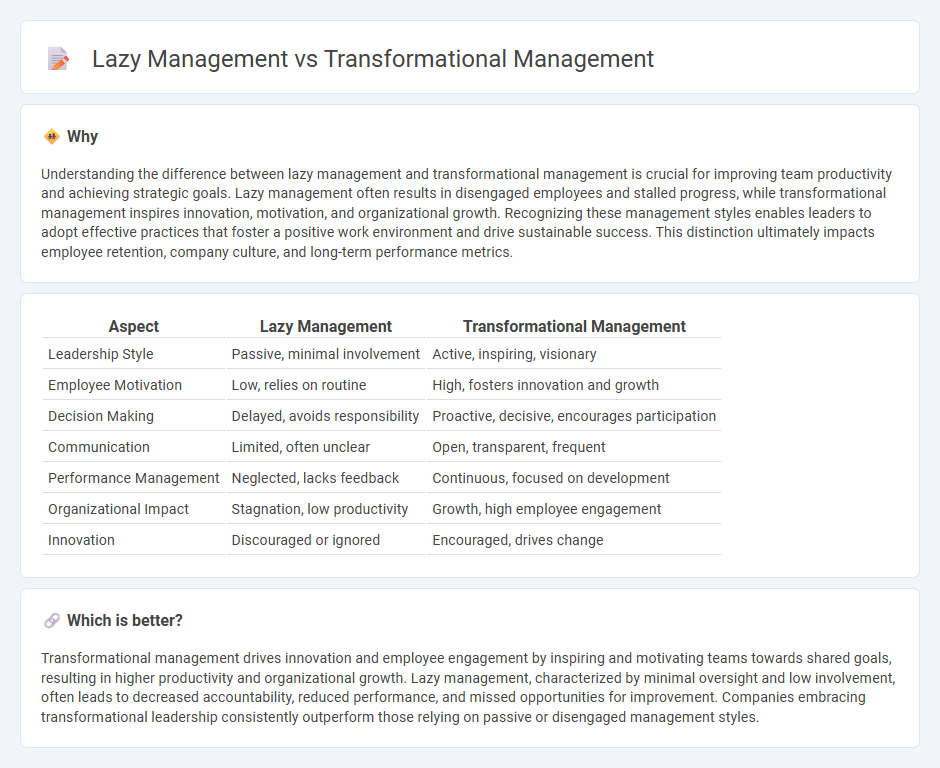
Lazy management often leads to minimal oversight and stagnant team performance, while transformational management inspires motivation and drives significant organizational change. Leaders who adopt transformational management foster innovation, boost employee engagement, and achieve higher productivity. Explore the key differences and benefits of these management styles to enhance your leadership approach.
Why it is important
Understanding the difference between lazy management and transformational management is crucial for improving team productivity and achieving strategic goals. Lazy management often results in disengaged employees and stalled progress, while transformational management inspires innovation, motivation, and organizational growth. Recognizing these management styles enables leaders to adopt effective practices that foster a positive work environment and drive sustainable success. This distinction ultimately impacts employee retention, company culture, and long-term performance metrics.
Comparison Table
| Aspect | Lazy Management | Transformational Management |
|---|---|---|
| Leadership Style | Passive, minimal involvement | Active, inspiring, visionary |
| Employee Motivation | Low, relies on routine | High, fosters innovation and growth |
| Decision Making | Delayed, avoids responsibility | Proactive, decisive, encourages participation |
| Communication | Limited, often unclear | Open, transparent, frequent |
| Performance Management | Neglected, lacks feedback | Continuous, focused on development |
| Organizational Impact | Stagnation, low productivity | Growth, high employee engagement |
| Innovation | Discouraged or ignored | Encouraged, drives change |
Which is better?
Transformational management drives innovation and employee engagement by inspiring and motivating teams towards shared goals, resulting in higher productivity and organizational growth. Lazy management, characterized by minimal oversight and low involvement, often leads to decreased accountability, reduced performance, and missed opportunities for improvement. Companies embracing transformational leadership consistently outperform those relying on passive or disengaged management styles.
Connection
Lazy management, characterized by minimal oversight and low engagement, contrasts with transformational management, which emphasizes motivation and active leadership to inspire change. When lazy management prevails, transformational initiatives often struggle due to lack of commitment and accountability. Effective transformational management requires proactive involvement to overcome the inertia created by passive or indifferent managerial approaches.
Key Terms
Visionary Leadership
Transformational management emphasizes visionary leadership by inspiring and motivating employees toward a shared mission, fostering innovation, and driving organizational change. Lazy management lacks proactive vision, often resulting in stagnation, low employee engagement, and missed growth opportunities. Explore how visionary leadership in transformational management can elevate your organization's success.
Employee Empowerment
Transformational management cultivates employee empowerment by inspiring autonomy, encouraging innovation, and fostering personal growth, which leads to higher motivation and productivity. Lazy management, by contrast, often neglects active engagement with employees, resulting in decreased morale and limited professional development. Explore how empowering leadership drives organizational success and unlocks employee potential.
Passive Supervision
Transformational management promotes active engagement and inspires employees to achieve higher performance through motivation and vision, while lazy management relies on passive supervision, often neglecting oversight and employee development. Passive supervision in lazy management can lead to decreased productivity, reduced morale, and missed opportunities for innovation and growth. Explore the impact of management styles on organizational success to better understand how active leadership drives team performance.
Source and External Links
Transformational Leadership - TechTarget - Transformational leadership inspires and motivates employees to drive organizational success through innovation and personal growth.
7 Transformational Leadership Characteristics to Develop - This webpage outlines the characteristics necessary for transformational leadership, including empowering others, inspiring change, and fostering creativity.
What Is Transformational Leadership? - Transformational leadership focuses on inspiring shared vision through personal growth, leading to benefits like increased employee engagement and financial success.
 dowidth.com
dowidth.com